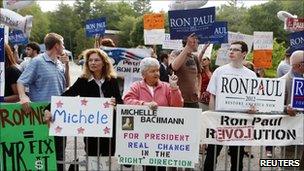Republican 2012 hopefuls open debate in New Hampshire
- Published
- comments
Michele Bachmann: "I was the very first member of Congress to introduce the full scale repeal of Obamacare"
Seven Republican presidential hopefuls have attacked President Barack Obama's economic record in the first major debate of the 2012 campaign.
The candidates for the party's nomination also focused criticism on his 2010 overhaul of the healthcare system, pledging to repeal "Obamacare".
They refrained from attacking one another, preferring to hit at Mr Obama.
Former Massachusetts governor Mitt Romney is the front-runner in the field bidding to challenge Mr Obama.
The first Republican primary elections do not take place until February.
The president's handling of the economy and healthcare reform quickly drew criticism, while his policies in Afghanistan and Libya also drew fire during the debate at Saint Anselm College, in New Hampshire.
'Obamacare' anger
Early on Mr Romney said Mr Obama had "failed" America, while former House Speaker Newt Gingrich said a new president was needed to end what he termed "the Obama depression".
Minnesota Representative Michele Bachmann, a favourite of the anti-tax Tea Party movement, said she had filed regulatory paperwork to enter the race officially, and criticised Mr Obama's effort to establish a universal healthcare programme.
"His report card right now has a big failing grade," Ms Bachmann said. "President Obama is a one-term president."
In addition, former Pennsylvania Senator Rick Santorum said Mr Obama's regulatory policies were "oppressive", and pledged to "unshackle" business.
Former Minnesota Governor Tim Pawlenty said Mr Obama was a "declinist" who viewed America as "one of equals around the world".
Congressman Ron Paul of Texas faulted the US Federal Reserve's anti-inflationary monetary policy for America's economic woes.
Former pizza restaurant mogul Herman Cain of Georgia called for the elimination of the federal capital gains tax to stimulate job growth.
Social concerns
When the debate turned to social issues, traditionally a key concern of Republican voters, five out of seven of the candidates said they would support an amendment to the US constitution banning same-sex marriage.
Ron Paul said he opposed one, but added that governments should not be involved in marriage policy at all.

Supporters of the presidential hopefuls gathered outside the debate venue
Mr Cain said individual states should be allowed to decide same-sex marriage policy on their own.
Mr Romney and Mr Santorum said they opposed a law passed in December 2010 to allow gays and lesbians to serve openly in the military.
Mr Gingrich said that the US Army and Marine Corps overwhelmingly opposed ending the ban on gays in the military, so he too opposed doing so.
However, a 2010 Pentagon survey, external of 115,000 service members found that 70% believed the impact on their units would be positive, mixed or of no consequence at all.
Other issues discussed included abortion, immigration and the place of church and faith both in the state and in the life of a president.
Romney's rival?
The candidates declined early opportunities to hit at Mr Romney, who has led in early polling but has been criticised for signing a healthcare policy while governor of Massachusetts that is conceptually similar to Mr Obama's programme.
Mr Gingrich's nascent campaign was hit last week by the resignation of most of his senior campaign staff, who cited strategic differences with the presidential hopeful.
Former US Ambassador to China Jon Huntsman was not at the debate, but is expected to formally declare his candidacy soon.
There is still much speculation about whether former Alaska Governor Sarah Palin, who has possibly the best name recognition of any of the field, will run for president.
Despite high unemployment in the US, Mr Obama heads most polls against the Republican hopefuls - although a recent ABC-Washington Post poll showed him in a surprise dead heat with Mr Romney.
Former White House press secretary Robert Gibbs appeared on TV hoping to counter criticism of Mr Obama.
He told CNN the declared candidates so far did not have a track record of creating jobs, and said that economic pain in the US began under the Republican presidency of George W Bush before Mr Obama took office.
The state of New Hampshire is an important early-voting state and is expected to hold its primary election to pick a candidate in February 2012.
- Published14 June 2011
- Published14 June 2011
- Published3 January 2012
- Published14 June 2011
- Published8 June 2011
- Published2 June 2011
- Published18 May 2011